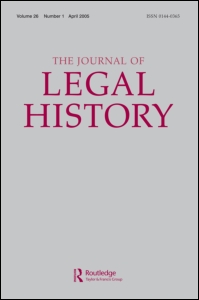Dr. Jaromir Tauchen (Brno) transmitted the Table of Content's of the open access-journal
Journal on European History of Law.
Research articles
• Peter Lutz Kalmbach: The German Courts-martial and their Cooperation with the Police Organizations during the World War II
• Martin Löhnig: Zur Geschichte des Erbverzichts
• Raluca Enescu: The Imperial Court of Justice, Police Authorities and Bertillon’s Measurements
• Marta Rodrigues Maffeis Moreira: Medical Responsability in Roman Private Law
• Gábor Hamza: Römisch-Holländisches Recht (Roman-Dutch law, Romeins-Hollands recht, Romeins-Hollands reg) und sein Geltungsbereich in Europa und außerhalb Europas
• István Sándor: The Medieval History and Development of Company Law
• Guy Lurie: What is Modern in the State of Exception?
• Ivan Kosnica: Citizenship in Croatia-Slavonia during the First World War
• József Szalma: Solidary and Divided Liability of Joint Tortfeasors - with Special Regards to the Provisions of the New Hungarian Civil Code
• Michał Gałędek: Juridification as an Ideology of Polizeiwissenschaft in 18th Century
• Adolfo Antonio Díaz-Bautista Cremades – Patricia Blanco Díez: Execution of Tax Credits in Rome
• Iván Siklósi: Some Thoughts on the Inexistence, Invalidity and Ineffectiveness of Juridical Acts in Roman Law and in its Subsequent Fate
• János Jusztinger: Economic Significance of the Ancient Roman Superficies
• Janos Erdődy: “Parsimonia atque tenuitas apud veteres custodita sunt” Certain Aspects of Laws Preventing Extravagant Expenditures in Roman Law
• Ibolya Katalin Koncz: Morning-gift, a Special Marital Legal Instrument
• Máté Pétervári: The History of Hungarian Civil Service from the Austro-Hungarian Compromise of 1867 to the First World War
• Katalin Siska: Thoughts on the Special Relationship between Nationalism and Islam in Particular the Late Ottoman Empire and the Early Turkish Republican Era
• Jiří Bílý: The Basic Methodology Problems in Study of Medieval Political and Legal Thought
• Veronika Steinová: National Mobilization of Labour Force in Czechoslovakia (1945 – 1949)
• Vojtěch Vrba – Pavel Homolka: Constitutional Conflict as the Basis for American Revolution
Book reviews
• Eva Kell – Sabine Penth (Hrsg.): Vom Empire zur Restauration. Die Saarregion im Umbruch 1814-1820
• Patricia Zambrana Moral: Estudios de Historia del Derecho penal. Vindicatio, inimicitia y represión penal en el Derecho español medieval y moderno
• Guido Fontaine: Fraulautern im Dritten Reich - die Geistlichkeit im Widerstand
• Janine Wolf: Aspekte des Urheberrechts bei Carl Maria von Weber, Albert Lortzing und Otto Nicolai
• Johannes M. Geisthardt: Zwischen Princeps und Res Publica. Tacitus, Plinius und die senatorische Selbstdarstellung in der Hohen Kaiserzeit
• Susanne Hähnchen: Rechtsgeschichte. Von der Römischen Antike bis zur Neuzeit
• Christian Fischer – Walter Pauly (Hrsg.): Höchstrichterliche Rechtsprechung in der frühen Bundesrepublik
• Michael Stolleis: Margarethe und der Mönch. Rechtsgeschichte in Geschichten
• Joachim Rückert: Abschiede vom Unrecht. Zur Rechtsgeschichte nach 1945
• Andreas Groten: Corpus und universitas: römisches Körperschafts- und Gesellschaftsrecht: zwischen griechischer Philosophie und römischer Politik
Reports from history of law
• Ludwig Marum zum Gedenken – Zur Verleihung des Marum-Preises 2016 an Diemut Majer
• „Gemeinsame Elemente des österreichischen und ungarischen Familienrechts zur Zeit der Doppelmonarchie und innerhalb der EU”. Bericht über das Forschungsseminar der Dezső-Márkus-Forschungsgruppe für Vergleichende Rechtsgeschichte (Pécs, den 25.-28. Oktober 2016)
• „Nichtgeborene Kinder des Liberalismus? – die Zivilgesetzgebung in Mitteleuropa in der Zwischenkriegszeit“
• In memoriam Imre Molnár (*1934 – †2016)
• Zum 30. Todestag von Christian Broda: Lebensskizze und Reformen
More information on the journal's
website.











